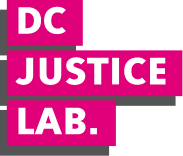
how can you impact the process?
How can you make DC safer, freer and more equal? There are many tactics and strategies that have been used to organize residents around the need to change laws, policies and budgets that anyone can use to make their voice heard and influence the policymaking process.
Tactics for weighing in on the process
You can develop an idea or identify something that needs to change.
Everyone is a stakeholder in public safety. It can start with you identifying a gap or problem in what currently exists based on your personal experience or that of others.
You can organize a group of people to engage in the process.
You could pull people together in meetings, or develop a signed petition on an issue, like Beverly Smith did to bring attention to the issue of Special and Campus Police Officers operating in DC and to change the law on how these security personnel operate. Similarly, the DC Public Restrooms campaign pulled a small group of people together to push the city to make safe and clean pubic restrooms available to everyone.
You can join a group of others who are working to change a law in DC.
There are organizations and coalitions that form specifically to impact an issue and work together to try to achieve a goal. For example, a group of organizations formed Safe and Free DC, a coalition to build support for a Black-led safety agenda. #HandsOffDC came together as a coalition in response to Congressional actions affecting DC’s self-governance and some of the people involved later created Free DC to continue that work.
You could join a community advisory committee.
There are a number of neighborhood organizations that meet regularly, like an Advisory Neighborhood Commission, a Police Service Area Citizens Advisory Council, or one of the many civic associations that exist across the city. These groups offer an opportunity to help develop the community’s perspective on a particular safety issue, and can potentially lift this message up to city agencies or DC elected officials.
You could join a board or commission.
There are about 2,000 opportunities for residents to serve on boards or commissions that give feedback to city agencies on their operations and work, like the Commission on Re-Entry and Returning Citizen Affairs or the Police Complaints Board. DC Council and the Mayor’s Office on Talent and Appointments have a role in appointing people to these boards. Most of these positions are unpaid, but some include reimbursements or small stipends.
You could contact your council members on an issue.
Every city council member has a website, with a list of their staff who you can call or email about an issue. The Council members also hold regular community meetings – you can attend these and bring up any issue that is a concern.
You could offer testimony on a bill being considered, the performance of an agency, or on a topic.
The committees of the DC Council hold hearings on topics, on bills, and hold annual oversight hearings on agencies as part of the budget process. You can sign up to provide verbal or written testimony on an issue.
You could publicize an issue in the media.
If you contact the media, you can publicize the need for elected officials to address an issue you care about. You can call in to a radio show that covers DC issues or write a letter to a newspaper editor in response to a news article, sharing your perspective on that topic. You can use social media, where you can help drive the cycle of coverage on an issue.
You can impact the election cycle.
In November 2026, five council members and all approximately 2,000 Advisory Neighborhood Commissioners will be up for reelection, and in November 2026, the Mayor, the Attorney General and seven Council members will be on the ballot. Along with voting and encouraging others to engage in the process, you can work with others to develop a voter’s guide on justice issues to raise the profile of something you think needs to be changed. You can even run for office, as Joel Castón did in 2021, becoming the first Advisory Neighborhood Commissioner elected while incarcerated in the DC Jail.
Case study: How DC Street Vendors Decriminalized Street Vending.
In 2023, a grassroots effort led by street vendors who suffered police harassment led to a law change that decriminalized vending without a license, establishing sidewalk vending zones, and forgiving unpaid licensing-related civil citations.
What are the continuous steps to changing policy?
- You identify an issue.
- You research how it can be changed.
- You develop the policy.
- You advocate for the change with lawmakers.
- If you pass it, you watch how it is implemented.
- You evaluate whether the change is working.
- You provide feedback so that the process can improve.


